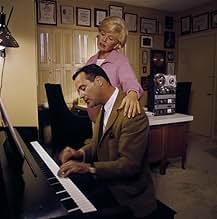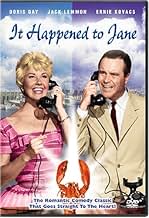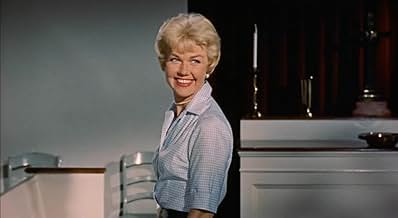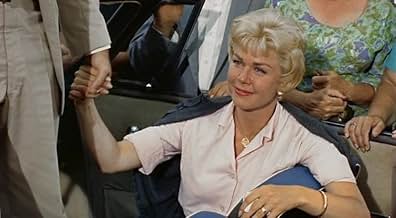Adicionar um enredo no seu idiomaJane Osgood runs a lobster business, which supports her two young children. Railroad staff inattention ruins her shipment, so with her lawyer George, Jane sues Harry Foster Malone, director ... Ler tudoJane Osgood runs a lobster business, which supports her two young children. Railroad staff inattention ruins her shipment, so with her lawyer George, Jane sues Harry Foster Malone, director of the line and the "meanest man in the world".Jane Osgood runs a lobster business, which supports her two young children. Railroad staff inattention ruins her shipment, so with her lawyer George, Jane sues Harry Foster Malone, director of the line and the "meanest man in the world".
- Selwyn Harris
- (as Casey Adams)
- Bob Paige - Host 'The Big Payoff'
- (as Bob Paige)
Avaliações em destaque
Rather than the lush, opulent interiors and wardrobe we usually look forward to in a Day comedy, this one is stunning for its exteriors. Filmed in New England in the summer of 1958, the film exudes idyllic small town splendor. Day plays Jane Osgood, a widowed entrepreneur (all "independent" women in 1950's TV or movies are either widows, as in Lucille Ball's later television work, or impossible-to-marry shrews like Joan Crawford in The Best of Everything). Osgood operates a budding lobster business, and when an expensive shipment is ruined by the laxity of the railroad, she takes on railroad magnet Harry Foster Malone in a highly publicized David & Goliath lawsuit. Ernie Kovacs is particularly memorable in his portrayal of Harry Foster Malone, an obvious and amusing allusion to Orson Welles' Charles Foster Kane, which was of course an allusion to William Randolph Hurst. In her legal battle, Osgood enlists the aid of local attorney and old friend George Denham, the man she's "supposed" to be with and just doesn't realize it, played well by a young Jack Lemmon. Throughout the course of the story, the film seems to at regular intervals inject some rather insightful observations on a multitude of thought-provoking topics, including the place and nature of democracy in a capitalist society, the overwhelming power wielded by big business, even the (at the time) ever expanding place of television in our lives and its ability to influence and inform. And all of this in a comedy!
The only negative I can think of is the inclusion of perhaps the worst musical number ever put on film. Jane Osgood is the den mother of the local boy-scout troop (naturally) and at the camp out in her back yard she leads them in a sing-a-long of the single most stupid, dreadful and endless song you ever heard in your life. "Be Prepared" well they warned you! It starts out as amusingly bad, but then seems to last about fifteen or twenty minutes until you think you'd rather take your own life than hear one more note. Any self-respecting boy scout over the age of five would kick you right in the nuts if you asked him to sing this wretched torturous piece of nonsense.
This aside (it is unfortunately not that uncommon in films of this era), this film benefits well from a strong, well written script and an excellent cast. It is actually much more intelligent and heart-warming than any of the Doris Day-Rock Hudson pairings, and while it is a very different kind of film, it can hold its own against any of those. Highly recommended, but be prepared to hit the "mute" button when those boy-scouts start singing!
As entertaining as these characters are, the movie really succeeds as a slice of idealized Americana. Whoever decided to film in an actual New England small town and use the residents for the many crowd scenes deserves a medal. The resulting visuals are a permanent record of small town America at mid-century and wonderfully colorful to look at. There's a bit of Norman Rockwell nostalgia in some of the set-ups that could have come off a Saturday Evening Post cover, especially those around the train station. And what could be more popularly American than the little guy (gal) besting the big guy at his own game. I just wish the script had eliminated the unnecessary and non-comedic Day/Forrest subplot, and instead mixed in more interaction between Kovacs and Lemmon whose chemistry is superb as shown in the under-rated Operation Mad Ball (1957). Nonetheless, there are enough compensations to make this a very watchable 90 minute diversion.
Você sabia?
- CuriosidadesJack Lemmon wrote that he thought this was a good, funny movie that didn't do well because of its "terrible title". He thought he and Doris Day had very good chemistry together, and he regretted that they never did another film.
- Erros de gravaçãoWhile the story supposedly takes place in Maine, in a railroad scene the Connecticut State Capitol can be seen in the background.
- Citações
Jane Osgood: Gentlemen, I will not take the money.
- ConexõesFeatured in AFI Life Achievement Award: A Tribute to Jack Lemmon (1988)
Principais escolhas
- How long is It Happened to Jane?Fornecido pela Alexa
Detalhes
- Data de lançamento
- País de origem
- Idioma
- Também conhecido como
- La indómita y el millonario
- Locações de filme
- Plainfield, Connecticut, EUA(exterior scenes)
- Empresa de produção
- Consulte mais créditos da empresa na IMDbPro
- Tempo de duração1 hora 37 minutos
- Proporção
- 1.85 : 1
Contribua para esta página







































